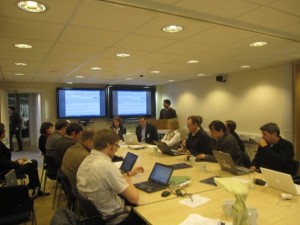For most of us, Facebook has become a pleasurable if banal ritual: checking wall posts and new pictures, poking an old friend. But in Egypt — where so much speech via traditional media, particularly political speech, is highly regulated and restricted — Facebook is rapidly becoming the mouthpiece of dissent. As Samantha Shapiro explains in this excellent New York Times Magazine piece, groups which oppose the de facto one party rule of Hosni Mubarak are mobilizing protests and debates through social networking technology like Facebook because it is more difficult to control and the audience is instant and diffuse. (Israel’s offensive in Gaza, and Egypt’s quiet response, has generated tremendous resistance, often manifested in Facebook-organized protests.)
Also, as Berkman’s Ethan Zuckerman speculates, Facebook is difficult to ban because it is also a popular source for non-political networking, and so a total site takedown negatively effects the millions of users who until the moment of censorship remainded largely apathetic. This is the so called “cute-cat theory of digital activism,” whereby average users, normally interested in uploading cute cat pictures, suddenly develops a political greivance against the censorsing authority. Egypt it seems contemplated banning the site; the fact they have not yet is remarkable.
The fact that Facebook speech is somewhat freer in Egypt has brought its political currents and opposition parties into greater profile. Of course, the banned Islamist party, the Muslim Brotherhood, figures large in this picture, but the great surprise of the Facebook revolution is how many liberal (the April 6 Movement) or left-leaning parties (like the coalition Kefaya party), however marginal, are joining the debate. This broadening of Egypt’s ideological horizons may be the result of Facebook; or perhaps it’s the other way around, with Facebook being the medium by which the interests and greivances of diverse polities come to the surface. Or, indeed, as Shaprio puts it:
The new technologies and political movements grew symbiotically.
That social networking technology like Facebook tends to produce and simulate an open forum of ideas — or has the potential to do so in spite of the police state’s threats — ought to be taken as a positive sign for emerging democracies where civil society is otherwise lacking. (James Glassman, the State Department’s outgoing undersecretary of public diplomacy has been watching these developments for precisely this reason; for more on Glassman, see my profile here.) Egypt, long stalled between corrupt secularism and Islamic fundamentalism, may find its political situation radically altered by the rise of Facebook literate citizens, ready to blog, question and organize for their causes.




 Click Here
Click Here